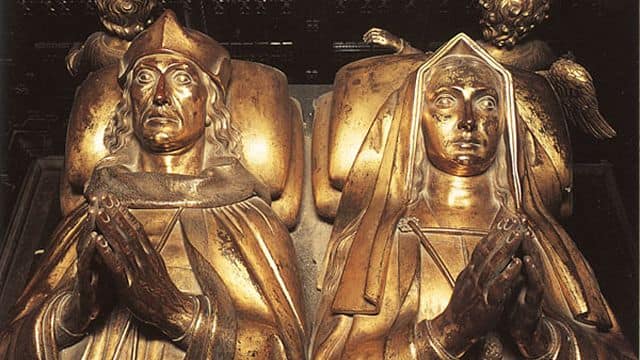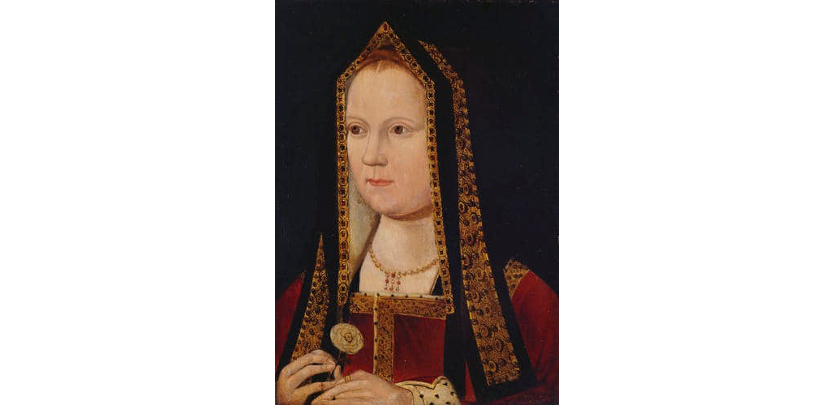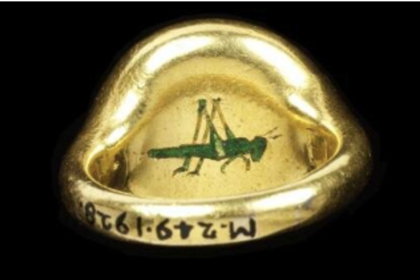The 11th of February commemorates both Elizabeth of York’s birth in 1466, and tragic death in 1503. She is remembered as the daughter of Edward IV, niece of Richard III, wife of Henry VII, and mother of Henry VIII.
Elizabeth was a very popular and beloved queen, described by a Venetian report as ‘a very handsome woman of great ability, and in conduct very able…[full of] charity and humanity.’ There is very little in the way of criticism to be found on her in contemporary accounts; by and large she was seen as the epitome of the ideal wife, mother, and queen.

Elizabeth’s death devastated her family, which is reflected in a small illumination in a manuscript that was presented to Henry VII shortly thereafter. For all his apparent cold ruthlessness as king, Henry VII was a devoted husband, and he grieved deeply for Elizabeth. And it was a double tragedy, as the couple’s newborn daughter also passed away. The manuscript was a 15th century passional, recounting the sufferings of saints and martyrs. It included a poem called ‘Le Miroir de la Mort’ (The Mirror of Death). It was a very apropos gift to a grieving husband and king. But the illumination is the most interesting feature of the text. It shows Henry VII in mourning garb, being presented with the manuscript. His daughters, Margaret and Mary, are seen playing together, wearing the black headdresses of mourning. The young, 11 year old Prince Henry, the future Henry VIII, can be seen in the background, crying into his mother’s bedclothes.
Another touching tribute to Elizabeth is an eulogy composed by Thomas More, at this time a mere lawyer and not yet the great statesman he would become, lamenting her death. The poem acknowledges the grief felt by each member of Elizabeth’s family – her husband, Henry VII; her daughters, Margaret and Mary; her son, Henry; her mother-in-law, Margaret Beaufort; and her sisters, Cicyly, Anne, Catharine, and Bridget.
~
O! ye that put your trust and confidence
In worldly joy and frail prosperity,
That so live here as ye should never hence,
Remember death and look here upon me;
Ensample I think there may no better be.1
Yourself wot well that in this realm was I
Your queen but late, and lo now here I lie.
~
Was I not born of old worthy lineage,
Was not my mother queen my, father king,
Was I not a king’s fare in marriage,
Had I not plenty of every pleasant thing?
Merciful God, this is a strange reckoning;
Riches, honour, wealth, and ancestry,
Hath me forsaken, and lo now here I lie.
~
If worship might have kept me, I had not gone,
If wit might have me saved, I needed not fear,
If money might have holpe, I lacked none,
But O! good God, what vaileth all this gear?
When Death is come thy mighty messenger,
Obey we must, there is no remedy,
Me hath he summoned, and lo now here I lie.
~
Yet was I late promised otherwise,
This year to live in wealth and delice;
Lo whereto cometh thy blandishing promise,
O! false astrology and devinatrice,
Of God’s secrets making thyself so wise;
How true is for this year thy prophecy,
The year yet lasteth, and lo now here I lie.
~
O brittle wealth, aye full of bitterness,
Thy single pleasure doubled is with pain;
Account my sorrow first and my distress
In sundrywise, and reckon thereagain
The joy that I have had, and I dare sayne,
For all my honour, endured yet have I
More woe than wealth, and lo now here I lie.
~
Where are our castles now, where are our towers?
Goodly Richmond soon art thou gone from me;
At Westminster, that costly work of yours,
Mine own dear lord, now shall I never see.
Almighty God vouchsafe to grant that ye,
For you and your children well may edify!
My palace builded is, and lo now here I lie.
~
Adieu mine own dear spouse, my worthy lord,
The faithful love that did us both combine,
In marriage and peaceable concord
Into your handes here I clean resign,
To be bestowed upon your children and mine.
Erst were you father, and now must you supply
The mother’s part also, for lo now here I lie.
~
Farewell my daughter, Lady Margaret,
God wot full oft it grieved hath my mind,
That ye should go where we should seldom meet,
Now am I gone and have left you behind.
O mortal folk that we be, very blind!
That we least fear, full oft it is most nigh,
From you depart I first, and lo now here I lie.
~
Farewell Madam, my lord’s worthy mother,
Comfort your son and be you of good cheer,
Take all a worth, for it will be none other.
Farewell my daughter Catharine, late the fare
To prince Arthur, mine own child so dear.
It booteth not for me to weep or cry,
Pray for my soul, for lo now here I lie.
~
Adieu Lord Henry, my loving son adieu,
Our Lord increase your honour and estate.
Adieu my daughter Mary, bright of hue,
God make you virtuous, wise and fortunate.
Adieu sweet heart, my little daughter Kate,
Thou shalt, sweet babe, such is thy destiny,
Thy mother never know, for lo now here I lie.
~
Lady Cicyly, Anne, and Catharine,
Farewell my well-beloved sisters three.
O! Lady Bridget, other sister mine,
Lo here the end of worldly vanity!
Now well are ye that earthly folly flee,
And heavenly thinges love and magnify.
Farewell and pray for me, for lo now here I lie.
~
Adieu my lords, adieu my ladies all,
Adieu my faithful servants every chone,
Adieu my commons, whom I never shall
See in this world; wherefore to the alone,
Immortal God, verily three and one,
I me commend; thy infinite mercy
Shew to thy servant, for lo now here I lie.
~

Top image: Portrait of Elizabeth of York, by the British School, c.1470-98





